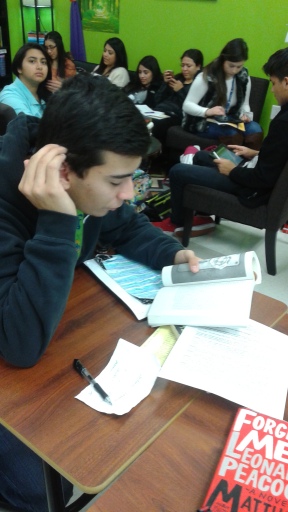Sometimes inspiration strikes at the most opportune times.
One day last week I had the honor of hosting two small groups of teachers from a different high school as they observed my classroom, one class period in the morning and another in the afternoon. Many of the teachers on their campus have been exploring and practicing with the workshop model for a while now, and they wanted to see my workshop classroom in action.
After each lesson, we met to debrief and hold a kind of question and answer session. Talk about an awesome experience (except for the voice in my head that kept saying “When did you become the expert on workshop? Yikes.)
I think one of the best things we can do as teachers is invite others into our rooms to watch us teach. Talk about keeping on the A Game. That’s a Try it Tuesday suggestion all in itself.
Here’s another one:
During one of those debriefs, one teacher asked about the conferences I conducted as my students read for the first 15 minutes of class. “What questions did you ask?
I explained that it depends on the student.
If I go with “How’s it going?”
My students answer, “Fine.”
If I go with “What are you thinking?”
My students answer, “Nothing.”
So I usually lead with “Tell me a little something about …will ya?” And then I listen to see what direction the conference might take.
That’s pretty much the genesis of every conference with my readers.
Another teacher mentioned that she and a colleague had been thinking about asking students to bring a question, thought, or problem to their reading conferences. You know, kind of like we ask students to do when we meet with them about writing. I’d never thought about it for a quick reading conference though. She wanted to know if I thought it was a good idea.
The image of this book came into my head. I found this copy of The Fault in Our Stars at a thrift store. It looked just like this: plastered with sticky notes that reflect the student’s thinking. Now, I have no idea why this book is tattooed with notes, but I can imagine a not-so-great idea.


I hope a teacher didn’t assign this book and ask students to bring ideas to a reading conference. If that happened, I doubt this student got into reading flow. I doubt this student enjoyed this lovely, heart-wrenching book. I doubt she felt the beauty of the language and felt the loss of a beloved character. Maybe all that happened, but it wouldn’t have happened for me.
I want my students to love to read. I think we have to be careful with what we ask them to do with their independent reading books besides fall in love with the story and the language. Sure, they may recognize craft, they may recognize characterization. But the important thing is that they recognize that they are liking to read. That is so important to so many of my readers. They have to realize they like reading.
I do believe we can, and should, ask students to revisit passages — and maybe even the whole of a book — from time to time, even quite often. We can teach many important reading and writing skills that way, but we have to temper our desire to teach a book to death, even the books students choose to read themselves.
What I told my inquiring friend: What if before independent reading time, on any given day, we ask students to read for a specific purpose.
Read to find interesting figurative language. Read to notice clever imagery. Read to discover how the writer shares an insight about a character. Read to find a beautiful or startling sentence. Or maybe a sentence that’s not really a sentence.

Fabian before class sharing his awe at the writing style of Jonathan Safron Foer in Extremely Loud & Incredibly Close
Isn’t this what readers do? I do. When I read a passage that strikes me in some way I want to share it. And let me tell you: When my students start to do this on their own? That’s celebration time.
“What about the student who cannot find anything to share?” you might ask.
Well, that’s important information, isn’t it? I don’t know, maybe like the kind we might discover in a one-on-one reading conference.
Right?
I’d love to know your thoughts on this. What ideas do you have that work for your reading conferences? Please share in the comments.
Big thanks and shout out to @Sean_G_Hood and @mrs_friend and the inspiring teachers at Hebron High School!
Tagged: book talks, Conferring, independent reading, Readers Writers Workshop, reading conferences, skills-based lessons

[…] has discussed why conferring matters, and how we shouldn’t make reading conferences into an official assessment, for fear of losing readers altogether. Our goal is to foster the growth of real readers and […]
LikeLiked by 1 person
We have our students “Lift a Line” each week and post it on Canvas. They also explain why they loved the line they chose. They also reply to at least one other student’s post. We have had some amazing conversations between students about these lines!
LikeLike